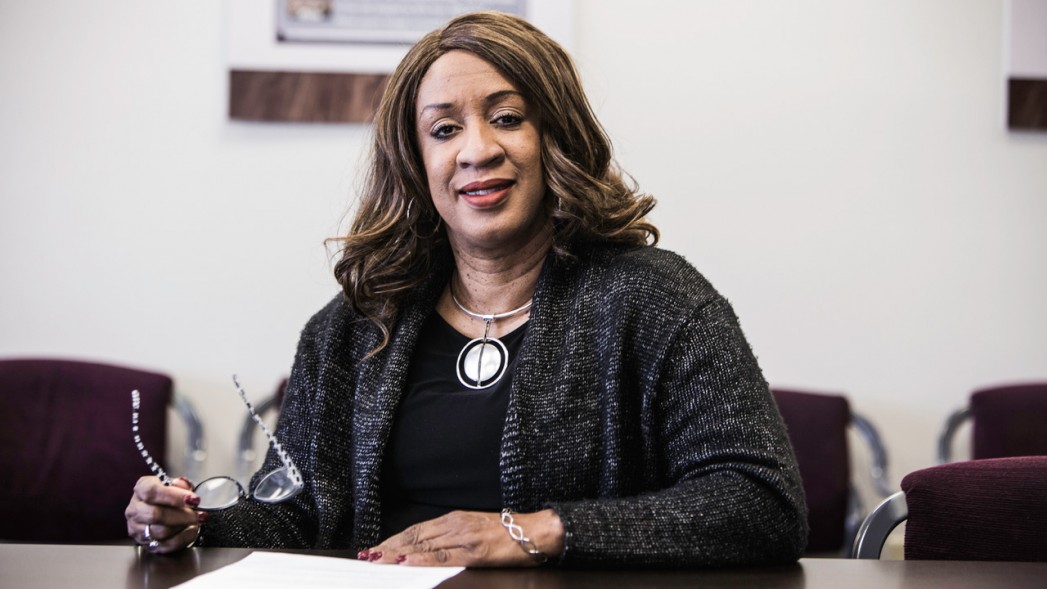Photos by Mickie Winters
Evon Smith didn’t usually respond to that kind of email, several of which she got a year. The 52-year-old had worked in banking. She’d tackled community- and economic-development projects in North Carolina that moved around hundreds of millions of dollars. She’d been for-profit, she’d been nonprofit. She’d been through leadership training at Harvard. So she got those types of emails.
But this one — from a group called OneWest in Louisville — was different. It let her know that these recruiters had done their homework, that they knew what kind of work she did, that she considered it, as she says, “more than a job.” And it also tossed her life up into the North Carolina air and dropped it a state or two away in Louisville, where she’s sitting this mid-February night, listening to the mayor’s speech. At the Kentucky Center for African American Heritage, a big crowd full of big names has packed in around a bartender and a spread including mashed avocado, kabobs with olives and cheese and ham, and what look like dumplings and eggrolls. A few moments ago, when the pleasant hum of conversation had plateaued and a magical number of elbows had been rubbed, Woody Porter of A.D. Porter & Sons Funeral Home, himself an institution, stood up from his wheelchair and got the speaking part of the night off to a charming start. Now Mayor Fischer stands before the clear podium in the corner, and though some of us have known him to be a bit monotonous, he’s killing with the crowd of suits, blouses, fleece vests with jeans. He’s thanking Porter and real estate developer Steve Poe for working together at a nonprofit. “Steve, thank you. You’ve been pushing, pushing,” he says. “Woody, if he’s the hammer, you’re the velvet,” and it’s like the Comedy Store in here. When Fischer talks about the injustice of redlining and “frankly, systemic, racist, institutionalized practices,” though, he gets a trio of mmhms.
Smith nods along from a nearby table, where she sits beside her 15-year-old daughter, who, she’ll tell the crowd when it’s her turn to address them, she had to pull out of her first year of high school in North Carolina. And her volleyball team. And her poetry group and her involvement in writing cartoons for autistic children and her support network of friends and family that Smith calls a “pillow of love.” She had to give up all that to move here. Smith also left her 24-year-old daughter at college and relocated her mother, who has Alzheimer’s, to Massachusetts. After the sacrifices, she finds it encouraging that the mayor is here, along with several Metro Council members, including Barbara Sexton Smith and Cheri Bryant Hamilton. Normally Evon Smith starts this work in a closet, she has joked. She has worked before with nothing at all but some people who want change. But this, she thinks, is like already having a baby in the crib, wrapped in blankets, with folks checking in on it, keeping it warm.

Photo: New OneWest CEO Evon Smith // by Mickie Winters
Back in 2014, well before Smith got the email about becoming the CEO of OneWest, the nonprofit got its start from that year’s class of Bingham Fellows, a group chosen annually to put their heads together and tackle an issue. That year, the question was west Louisville, and the answer, developer Steve Poe said, was a nonprofit organization that could focus revitalization efforts over the long term, beyond the political cycles limiting government. It would buy land to develop. It would help business owners improve their stores. It would collaborate with other organizations working in west Louisville. It wouldn’t be pigeonholed. Basically, it would do any and everything it could to build commercial prosperity in west Louisville.
Poe had hoped to hire a CEO and staff within a year, which didn’t exactly work out. The organization has been light on personnel, with few employees other than interim director Jenny Recktenwald and a couple of interns. But the OneWest board, which includes CEOs of major banks and representatives from each of the nine neighborhoods in west Louisville, has been meeting weekly over the past few years. They’ve conducted community meetings to hear from residents, who, Smith knows, want grocery stores, sit-down restaurants, pharmacies. The board has been developing a strategic plan, and looking into building on the momentum of the YMCA and Passport Health Center planned for 18th and Broadway. OneWest wants to put together a staff that would help pick up trash and encourage business owners to keep streets cleaned up. Chuck Denny of PNC is leading a capital campaign that Smith hopes will amount to $50 million in the next five years.
Smith’s proudest accomplishment is her work in Winston-Salem, a city in North Carolina where she helped revitalize a predominantly black area of downtown that she compares to west Louisville. She helped bring in a credit union. Nascent retail bays grew along a street. Residences popped up. Several OneWest board members mention the project to me. “We got our architects and our landscape designers work. We got our local engineers work. We got our local contractors work. We were able to circulate that dollar back in our community many times over,” Smith says. “And we were able to pull in federal, state and local and philanthropic money, so it was a great public-private — numerous public-private collaborations all throughout the project. Which is what I think we’re going to do here in Louisville.”
That kind of talk impressed OneWest board member and president of JPMorgan Chase’s Kentucky market, Paul Costel, who led the search committee. Beyond her experience in economic development, Costel says, Smith has the ability “to interact with people of all walks of life. I think she could interact with somebody on the street as well as the CEO of a major institution here.”
It is clear that Smith has done her homework, too. She has popped in to West End restaurants to chat with people about their hopes for their neighborhoods, before they knew who she was. She has met with the Urban League. She knows all the numbers about west Louisville’s 60,000 residents, the discrepancies in employment, education, health, housing. And she adds numbers from Nielsen: “It was estimated that the residents of the nine neighborhoods spend approximately $474.8 million on retail goods and services annually, but only $258 million of sales occur in the West End, leaving retail sales leakage at about 46 percent of all purchases made,” she tells me, reading from a page in the OneWest office on West Broadway, which straddles the California and Russell neighborhoods. “So that’s a huge amount of gap. And also a huge amount of opportunity.”
Smith isn’t worried about being an outsider. She was an outsider in Winston-Salem. She was an outsider when she worked in development in Greensboro, North Carolina. “All I can say is: I’ve got experience and talent and energy. And I’ve got success projects under my belt, projects that were successful for the communities I served. If you want that, I’m here to offer it,” she says. “And I think caring about communities is not germane to where you were born and raised. Caring about communities in America is just about getting in there and wanting to see people have a better life experience, a quality of life.”
Smith often uses phrases like “social capital” and emphasizes that the residents of west Louisville have to be included in any economic-development work that moves ahead in their communities. When Fischer tells the crowd that Louisville must avoid gentrification, they applaud.
Smith wraps the room around her little finger, calling Louisville a city of graciousness. She has moved into a place on River Road near the Big Four Bridge, and in addition to touring all of the nine neighborhoods in the West End, she’s getting to know the East End too.
“I thought that the best way to explain to you all tonight what it feels like when looking at the work to be done in west Louisville: It’s like having an Olympic body,” she says. “You know, you look at Louisville, and you all have beautiful bridges and the waterway, and the lovely waterfront area and the restaurants. And you’re a foodie town, which I love. But it’s like having an Olympic body with gangrene set in on your left leg.” (Mmhm, a woman says. Yes, a man adds.) “How can you sprint? How can you compete? How can you be attractive to businesses and research industry of all kinds if you are promoting a city with gangrene in your left leg? You can’t do it. The body has to be whole. The body has to be whole, and we can make the body whole.”
This originally appeared in the March 2018 issue of Louisville Magazine. Every story in our March issue is about west Louisville, and we’ve barely scratched the surface. Click here to read more from part four of our series on the West End.
To subscribe to Louisville Magazine, click here. To find us on newsstands, click here.



